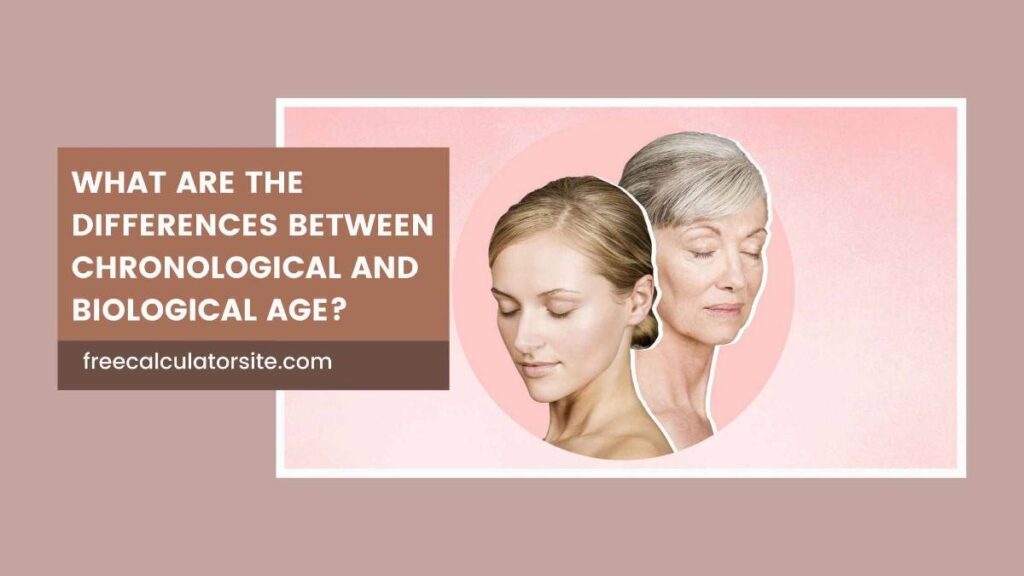Last updated on October 22nd, 2024 at 11:27 pm

Age is often seen as a number that defines where we are in our journey of life.
However, the simple number that shows how many years we’ve been alive—our chronological age—doesn’t always reflect our physical or biological condition.
This is where the concept of biological age comes into play.
Understanding the differences between these two types of ages offers a deeper insight into health, aging, and how time affects us.
This article delves into the distinctions between chronological age and biological age, the factors influencing each, and how knowing both can lead to better health and lifestyle decisions.
Chronological Age: The Standard Measurement
Chronological age is the most straightforward way we think about age.
It’s simply the number of years, months, and days a person has been alive, starting from their date of birth.
When someone asks how old you are, they’re asking for your chronological age.
For example, if you were born on January 1, 2000, and today’s date is January 1, 2024, your chronological age is 24 years.
How It’s Calculated
Chronological age is calculated based on the passage of time, often measured in complete years.
While it’s an accurate measure of how long a person has lived, it doesn’t necessarily reflect their physical or mental health.
For example, two people may have the same chronological age, but one may feel young and healthy while the other may experience signs of aging, such as chronic illnesses or mobility issues.
Biological Age: A Measure of Health and Vitality
Unlike chronological age, biological age doesn’t rely on your date of birth but instead measures how well your body is functioning.
Biological age takes into account factors such as:
- Cellular health
- Organ function
- Physical fitness
- Mental sharpness
- Genetic predispositions
This means that someone who is 50 years old chronologically might have a biological age of 40 if their body is in good condition.
Conversely, another 50-year-old might have a biological age of 60 if they suffer from chronic health problems or lead an unhealthy lifestyle.
How It’s Assessed
Biological age is calculated using a variety of markers, including:
- Telomere length: Telomeres are protective caps on the ends of chromosomes that shorten as we age. Shorter telomeres are associated with a higher biological age.
- Epigenetic markers: These are changes to gene expression that happen due to lifestyle factors such as stress, diet, and exposure to toxins.
- Blood biomarkers: Cholesterol levels, blood pressure, and glucose levels can all be indicators of biological age.
- Physical assessments: Muscle mass, bone density, and cardiovascular fitness are additional markers.
Advanced tools, such as biological age calculators and tests, are now available that assess various health parameters to give an estimate of a person’s biological age.
Key Differences Between Chronological and Biological Age
The differences between chronological and biological age go beyond mere numbers.
Here’s a closer look at the core distinctions:
Aging Process
- Chronological Age: This is a linear process, where time passes at the same rate for everyone. You turn one year older every 365 days.
- Biological Age: The aging process isn’t uniform. Someone’s biological age can advance more slowly or more rapidly than their chronological age, depending on genetics and lifestyle.
Impact on Health
- Chronological Age: This tells us little about the state of someone’s health. For instance, a 50-year-old could be in excellent shape, or they could be struggling with various illnesses.
- Biological Age: This is directly tied to the body’s overall condition. A lower biological age generally means that someone’s body is healthier and more resilient, regardless of their chronological age.
Predictive Power
- Chronological Age: It’s a simple indicator of time, offering little insight into how long a person might live or their risk of developing age-related diseases.
- Biological Age: Biological age is considered a better predictor of longevity and disease risk. People with a lower biological age compared to their chronological age are often healthier and may live longer.
Also Read: Applications of Chronological Age
Factors Influencing Biological Age
While chronological age is inevitable, biological age is influenced by several factors, many of which are within our control:
1. Lifestyle Choices
The way we live has a direct impact on biological aging.
Healthy habits such as regular exercise, a balanced diet, not smoking, and getting enough sleep can slow down biological aging.
On the other hand, habits such as a sedentary lifestyle, poor nutrition, excessive alcohol consumption, and stress can accelerate it.
2. Genetics
Genetics also play a role in biological aging.
Some people are naturally predisposed to longer telomeres or more efficient DNA repair, which can slow down the aging process.
3. Environment
Environmental factors, such as pollution, exposure to harmful chemicals, and even socioeconomic status, can influence biological aging.
People living in areas with high pollution levels or those with limited access to healthcare may age more quickly biologically than their chronological age would suggest.
4. Stress and Mental Health
Chronic stress, anxiety, and depression can increase biological aging by impacting hormone levels, immune function, and inflammation.
In contrast, mindfulness practices, meditation, and emotional well-being contribute to a slower biological aging process.
Why Knowing the Difference Matters
Understanding the difference between chronological and biological age can be a game-changer in terms of health and well-being.
While we can’t stop time from moving forward chronologically, there are steps we can take to slow down our biological age.
1. Proactive Health Management
If you’re aware that your biological age is higher than your chronological age, it can be a wake-up call to make changes in your lifestyle.
Regular check-ups, adopting healthier habits, and addressing potential issues early can improve your overall health and longevity.
2. Personalized Approach to Aging
Knowing your biological age allows for a more personalized approach to health care.
Rather than focusing solely on age-based recommendations, like screening tests starting at a certain age, treatments and preventative measures can be tailored to your biological condition.
3. Enhancing Quality of Life
A lower biological age generally correlates with better physical and mental well-being, higher energy levels, and reduced risk of diseases.
Focusing on biological age means prioritizing a high quality of life as you age, rather than just adding years to your life.
Conclusion
In essence, chronological age is just a number that marks how many years you’ve been alive, while biological age provides insight into how well your body is actually functioning.
By focusing on biological age, we gain a clearer picture of our health, allowing us to make smarter lifestyle choices and potentially slow down the aging process.
Aging is inevitable, but how we age is not.
Through understanding and managing our biological age, we can live longer, healthier, and more vibrant lives, independent of the calendar.

Akash Singh is a finance enthusiast who shares valuable insights on various calculators.
